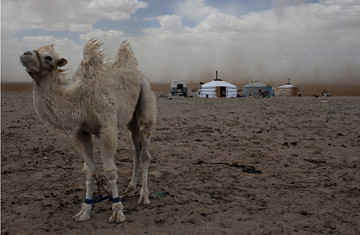
Nomads still live in traditional gers around Mongolia's biggest economic undertaking: the Oyu Tolgoi mine.
(2 of 6)
Everything changes, though, when there's at least $1.3 trillion in untapped minerals beneath the soil. China and Russia are hungrily eyeing Mongolia's treasure trove, provoking consternation in a country that proudly guards its hard-won independence. The U.S. has taken an interest in the fate of this faraway land in order to check the power of Mongolia's giant neighbors. As the country negotiates this tricky geopolitical landscape, it must avoid the resource curse that has bedeviled mineral-rich but desperately poor places like Nigeria. "We can't just be 'Mine-golia,'" says Tsagaan. "Otherwise we will boom and then bust." The perils of a young democracy, which in Mongolia has spawned a bitter rivalry between two political titans, threaten stability too. "Everyone knows that Mongolia has many natural resources," says President Tsakhia Elbegdorj. "But whether these resources mean we succeed or fail depends on our governance. That is our biggest challenge."
Road to Democracy
Born in a Camel-hair tent in the shadows of the Altai Mountains, Elbegdorj has lived a life that mirrors Mongolia's shifting fortunes. The eighth and last son of herders, he won a scholarship to study military journalism in Ukraine after impressing apparatchiks with a poem about the glories of socialism. By 1988, Elbegdorj was back in Mongolia; he started a newspaper called Democracy and helped lead the country's 1990 democratic revolution. "Before, even the smallest political decision was made in the Kremlin," he says. "Now we're in charge of our own future."
Since emerging from seven decades of communist rule, Mongolia has held six parliamentary elections. Voter participation in this sparsely populated land has at times broken 80%. Herders think little of traveling by horseback for days to reach a polling station. "In Mongolia, elections are the best system, because we like to do things our own way," says 54-year-old Baatar (many Mongolians use only one name), who cast his vote in the June 28 parliamentary elections at a small school surrounded by grasslands. "In America, do you also have elections like we do in Mongolia?" Baatar asks.
In 2000, after his first, brief tenure as Mongolia's youngest Prime Minister was foiled by inexperience and political turbulence, Elbegdorj decided he needed a break. "I had been trained in one superpower," he says, "but it was the wrong one." So off went Elbegdorj to the U.S., where he studied English in Colorado and then completed a master's in public administration at Harvard's John F. Kennedy School of Government. He then interned at Radio Free Asia, the Washington-based service that broadcasts news in native languages to repressed societies. His job was to provide broadcasts to Inner Mongolia, the Chinese region where tensions have simmered between Mongolian and ethnic--Han Chinese populations. Elbegdorj was probably the only intern in Washington with "Prime Minister" on his CV.
